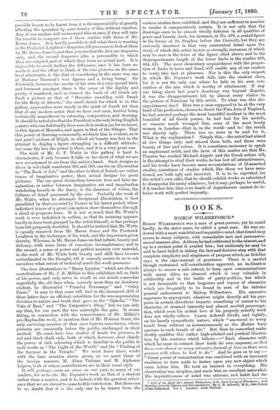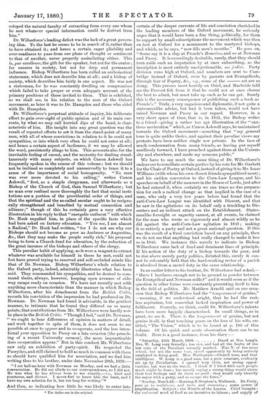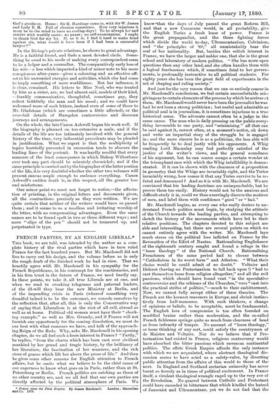BOOKS.
BISHOP WILBERFORCE.*
Bmwor WILBERFORCE was a man of great powers, yet he could hardly, in the strict sense, be called a great man. He was en- dowed with a most watchful and inquisitive mind, that found.easy access to many subjects, with remarkable tact and persuasive- ness of manner, also. Address he had cultivated to the utmost,and. up to a certain point it availed him ; but uniformly-he maybe said to have failed in taking the last and decisive step with that complete simplicity and singleness of purpose which, as Schiller says, is the sign-manual of greatness. There is a careful though restrained self-consideration apparent, an inclination always to secure a safe retreat, to keep open communications with many sides, an element which is very valuable in soldiership and in the battle of party-politics, but which is not favourable to that largeness and repose of character which are frequently to be found in men of far inferior• general endowment to Bishop Wilberforce. His • excessive- eagerness to appropriate whatever might directly aid his pur- poses in certain directions imparts something of unrest to his character, of strained intensity and almost morbid preoccupa- tion, which even his ardent love of his properly priestly work does not wholly relieve. Canon Ashwell dwells, and rightly, on his keenly sympathetic nature, which "answered to every touch from without as instantaneously as the 2Eolian harp answers to each breath of air." But then he somewhat mala- droitly qualifies this rather high-pitched and poetical illustra- tion by the sentence which follows :—" Each character with which he came in contact drew forth its own response, so that there were almost as many estimates formed of him as there were persons with whom he had to do." And he goes on to say :- "Great power of concentration was combined with an incessant readiness to turn aside to fasten upon any new object which came before him. He took an interest in everything. His observation was sleepless, and made him an excellent naturalist. His inquisitiveness of mind was extreme, and habit had de- • Life of Me Right Rev. Samuel Wilberforce, D.D., Lord Bishop of -Winchester ; with Selections from his Diaries and Correspondence. By A. R. Ashwell, M.A., late Canon of the Cathedral. Vol. 1. London : John Murray.
veloped the natural faculty of extracting from every one whom he met whatever special information could be derived from him."
Dr. Wilberforoe's leading defect was the lack of a great govern- ing idea. To the last he seems to be in search of it, rather than to have -obtained it; and hence a certain eager pliability and over-readiness to pass from one plane of thought or sentiment to that of another, never properly assimilating either. This is, par excellence, the gift for the speaker, but not for the orator ; for success in society, but not for deep and permanent influence. Bishop Wilberforce has been called an ecclesiastical statesman, which does not describe him at all ; and a bishop of society, which describes him fairly in one aspect. He was not a statesman, for he was constantly dwelling on compromises which failed to take proper or even adequate account of the primary positions of those invited to them. This is exhibited, as we shall see, in his relation to the men of the Oxford movement, as later it was to Dr. Hampden and those who sided with Dr. Hampden.
Dr. Wilberforce's perpetual attitude of inquiry, his deliberate effort to gain over-sight of public opinion and of its main cur- rents, by what we may call hurried dips of the hand, is char- acteristic of him. His insight into any great question was the result of repeated efforts to see it from the stand-point of many men, with all of whose convictions in relation to it he could not sympathise, or into which very often he could not enter at all ; and hence a certain aspect of facileness, if we may be allowed the word, persistently clings to him. This accounts also for the inevitable feeling of unrest, and the necessity for dealing simul- taneously with many subjects, on which Canon Ashwell has frequently spoken in the course of this volume; but we should not be inclined so completely and unreservedly to trace it to a sense of the importance of social homogeneity. "No man was ever more devoted to his calling," writes Canon Ashwell, " first, as a simple clergyman, and afterwards as a Bishop of the Church of God, than Samuel Wilberforce ; but
no man ever realised more thoroughly the fact that social insti- tutions are a portion of the providential order of things, and that the spiritual and the so-called secular ought to be recipro- seally -strengthened and benefited by mutual connection and alliance ;" though of this he certainly gave a very effective illustration in his reply to that " energetic outburst " with which Dr. Hook supplied him, in place of the specific facts which had been asked on factory education. " You see, I am almost a Radical," Dr. Hook had written, "for I do not see why our Bishops should not become as poor as Ambrose or Augustine, &c., that they may make the people really rich," his proposal being to form a Church fund for education, by the reduction of the great incomes of the bishops and others of the clergy.
This peculiar habit of applying, as it were a magnet to extract
whatever was available for himself in those he met, could not but have proved trying to reserved and self-secluded minds like that of Dr. Newman. Bishop Wilberforce's whole relation to the Oxford party, indeed, admirably illustrates what has been said. They commanded his sympathies, and he desired to com- mand theirs, always, however, keeping open avenues of side- way escape ready on occasion. We have not recently met with anything more characteristic than the manner in which Bishop Wilberforce, after his detachment from the British Critic, records his conviction of the impression he had produced on Dr. Newman. Dr. Newman had found it advisable, in the gentlest manner, to intimate that he found they differed on so many points, that contributions from Mr. Wilberforce were hardly now in place in the British Critic. "Though I feel," said Dr. Newman, 4' we ought to bear differences of opinion in matters of detail, and work together in spite of them, it does not seem to me possible at once to oppose and to co-operate, and the less inten- tional your opposition to Pusey on a late occasion [the preach- ing of a recent University sermon], the more impracticable does co-operation appear." But in this conduct Mr. Wilberforce saw only an exhibition of party-spirit. He respected the Paseyites, and still claimed to hold as much in common with them as should have qualified him for association, and we find him writing thus to his brother, under date November 29th, 1838 :- "I sat half-an-hour with Newman on Monday, and we bad a little conversation. He did not allude to our correspondence, so I did not. He was what he has always been to me exactly,—i.e., kind and courteous, and distant. I never feel to know him the least, and I have my own solution for it, but too long for writing."*
And then, as indicating how little he was likely to enter into
• The italics are in the original.
certain of the deeper currents of life and conviction cherished in the leading members of the Oxford movement, he seriously urges that it would have been a fine thing, politically, for them to support by small subscriptions the movement which was then on foot at Oxford for a monument to the martyred bishops, and which, as he says, " now fills men's mouths." He goes on, " Some say it is a slap at Froude's Remains, and so at Newman and Pusey. It is exceedingly desirable, surely, that they should turn aside such an imputation by at once subscribing, as the inscription is most entirely unobjectionable, me judice. Party division runs high at Oxford, and numbers are sent to Cam- bridge instead of Oxford, even by parents not Evangelicals, through fear of Popery, &c., e.g., some of the — set are so doing. This presses most heavily on Oriel, and Macbride told me the Provost felt from it that he could not at once choose the best to admit, but must take up such as he can get. Surely this is the necessary consequence of publishing such a book as Fronde's." Truly, a very sagacious and diplomatic, if not quite a statesmanlike advice, but had it been taken, would not have raised Newman and Pusey in our regard. However, in a very short space of time, that is, in 1841, the Bishop writes to a friend—giving a rather too apt illustration of the " cau- tious moderation " which, as Canon Ashwell says, he maintained towards the Oxford movement—asserting that " my general tone is quite unlike theirs, and against their peculiar views my protests have been neither single nor private. In the face of much condemnation from many friends, as having put myself needlessly forward, I have preached against them at the Univer- sity and elsewhere, and made my sermons public."
We have to say much the same thing of Dr. Wilberforce's endeavour to conciliate certain parties by his vote for Mr. Garbett for the Chair of Poetry at Oxford, instead of giving it to Mr. Isaac Williams (with whom his own closest friends sympathised most) ; and his sudden conversion to the Corn-Law League, and his speeches on behalf of the measure in the House of Lords, just after he had entered it, when certainly we can trace no due prepara- tion for such a radical change as that implied in the case of a man, who only a very few years before had found that the anti-Corn-Law League was identified with Dissent, and that he saw in the agitations on its behalf only a truckling to Dis- senters and an indirect attack on the Establishment. States- manlike foresight or sagacity cannot, at all events, be claimed for the man who wrote so vigorously and almost wildly as he did against the anti-Corn-Law agitation in 1841; making it so entirely a party and not a great national question. If this was the result of a fixed conviction based on any principle, then we do not see that anything had really changed to make it less so in 1846. We instance this merely to indicate in Bishop Wilberforce some lack of fixed and dominant lines of principle. If his notion of the duty of a bishop towards the poor, and to rise above merely party politics, dictated this, surely it can- not be colourably held that the hard-working rector of a parish is absolved from a sacred duty in the same relationship.
In an earlier letter to his brother, Dr. Wilberforce had asked,— " Have I hardness enough not to be ground to powder between the Evangelical and Newman mills ?" and it would seem as if the question in other forms were constantly presenting itself to him in the field of politics. Mr. Matthew Arnold said on one occa- sion that Bishop Wilberforce had the "temperament of genius," —meaning, if we understood aright, that he had the rest- less aspiration, but somewhat lacked inspiration and power of fulfilment. Scarcely, we think, could Dr. Wilberforce's talents have been more happily characterised. In small things, as in great, we see it. There is the temperament of genius, but not genius itself, in that touching poem on the loss of his wife, en- titled, " The Vision," which is to be found at p. 186 of this volume. Of his quick and acute observation there can be no doubt. Here is a good instance, from his diary :- "Saturday, 24th March, 1838.— Dined at Mrs. Long's. Mrs. W. Long very friendly ; too rive, and had all the faults of the low tone of the Peculiars strongly marked. Miss N. of the same school, but not the same tone, saved apparently by being actively employed in doing good. Miss Waldegrave—Church tone, and that intelligent. IV. Long is a good man, but a poor creature, evidently set up by Peculiarism. I opened very little, not seeing oppor-
tunities, but was on the watch. I think if I lived with such people much might be done ; but merely saying a strong thing would alarm their best feelings and do them no good : they would only identify the sayer with a party, and so escape the force."
"Sunday, March 25.—Morning, S. Stephen's, Walbrook. Dr. Croly, poor as to usefulness, and taste, and reasoning ; some power of amplification. Subject : the Miracle of the Loaves. Chief thought : the universal need of food as an incentive to labour; and supply of
God's goodness. Home : Sir H. Hardinge came in, with Sir W. James and Lady E. H. Full of election committee. How very injurious it must be to the mind to have no cooling-days ! To be always hot and restive with worldly cares : no pause ; no self-examination. I ought to thank God for my lot. If, as it is, I find it hard to make head against sin, what would it have been if I had been a successful lawyer ?"
In the Bishop's private relations, he shows to great advantage.
He is a faithful friend, and finds a most devoted circle. Some- thing he owed to his mode of making every correspondent seem
to be a helper and a counsellor. The comparatively early loss of his wife—a loss which imparted a kind of minor note to his more conspicuous after-years—gives a colouring and an effective off-
set to his unwearied energies and activities, which else had come to imply something of mere worldliness. But her influence, it is clear, remained. His letters to Miss Noel; who was treated by him as a sister, are, we had almost said, models of their kind, —frankly communicative, thoughtful, sometimes gay, they reflect faithfully the man and his mood ; and we could have
welcomed more of such letters, instead even of some of those to Mr. Gladstone (which are sometimes a little affected), or the over-full details of Hampden controversies and diocesan journeys and arrangements.
On the whole, the late Canon Ashwell began his work well. If the biography is planned on too extensive a scale, and if the details of the life are too intimately involved with the general history of the time, very influential precedents may be pleaded in justification. What we regret is that the multiplicity of topics hurriedly presented in succession tends to obscure the leading lines of the portrait. It was hardly needful that every measure of the least consequence in which Bishop Wilberforce ever took any part should be minutely chronicled; and if the same principle is carried out by the biographer of the latter portion of the life, it is very doubtful whether the other two volumes will
present canvas ample enough to embrace everything. Canon Ashwell's sudden death is, in this respect, all the greater loss and misfortune.
One minor point we must not forget to notice,—the affecta- tion of printing, in the original letters and documents given, all the contractions precisely as they were written. We are quite certain that neither of the writers would have so passed them ; and it seems to us a needless and irritating worship of the letter, with no compensating advantages. Even the same names are to be found spelt in two or three different ways ; and mere " slips of the pen " should not be treasured up, and perpetuated in type.




































 Previous page
Previous page